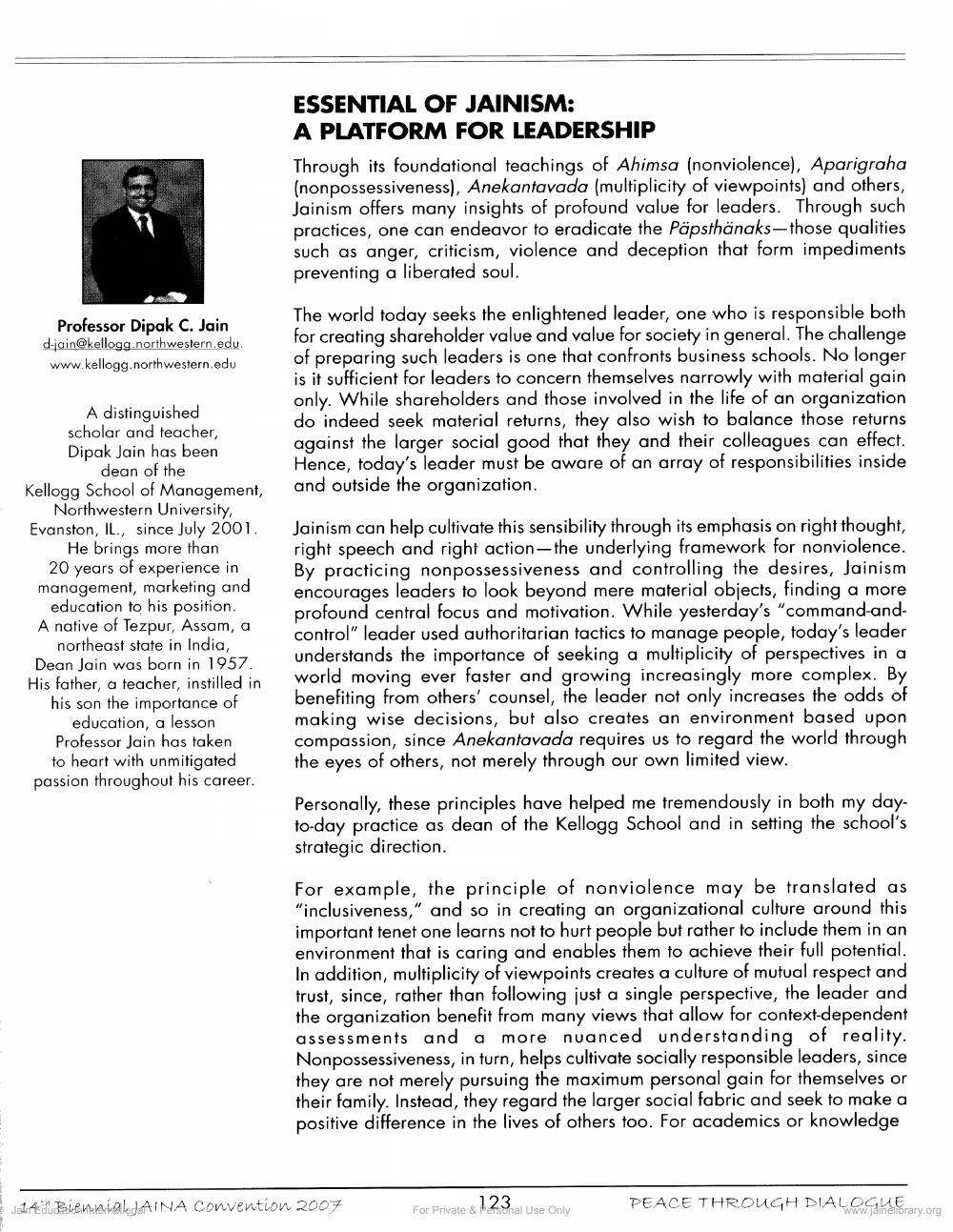________________
Professor Dipak C. Jain
[email protected]. www.kellogg.northwestern.edu
A distinguished scholar and teacher, Dipak Jain has been dean of the
Kellogg School of Management, Northwestern University, Evanston, IL., since July 2001. He brings more than 20 years of experience in management, marketing and education to his position. A native of Tezpur, Assam, a northeast state in India, Dean Jain was born in 1957. His father, a teacher, instilled in his son the importance of education, a lesson Professor Jain has taken to heart with unmitigated passion throughout his career.
ESSENTIAL OF JAINISM:
A PLATFORM FOR LEADERSHIP
Through its foundational teachings of Ahimsa (nonviolence), Aparigraha (nonpossessiveness), Anekantavada (multiplicity of viewpoints) and others, Jainism offers many insights of profound value for leaders. Through such practices, one can endeavor to eradicate the Päpsthänaks-those qualities such as anger, criticism, violence and deception that form impediments. preventing a liberated soul.
The world today seeks the enlightened leader, one who is responsible both for creating shareholder value and value for society in general. The challenge of preparing such leaders is one that confronts business schools. No longer is it sufficient for leaders to concern themselves narrowly with material gain only. While shareholders and those involved in the life of an organization do indeed seek material returns, they also wish to balance those returns against the larger social good that they and their colleagues can effect. Hence, today's leader must be aware of an array of responsibilities inside and outside the organization.
Jainism can help cultivate this sensibility through its emphasis on right thought, right speech and right action-the underlying framework for nonviolence. By practicing nonpossessiveness and controlling the desires, Jainism encourages leaders to look beyond mere material objects, finding a more profound central focus and motivation. While yesterday's "command-andcontrol" leader used authoritarian tactics to manage people, today's leader understands the importance of seeking a multiplicity of perspectives in a world moving ever faster and growing increasingly more complex. By benefiting from others' counsel, the leader not only increases the odds of making wise decisions, but also creates an environment based upon compassion, since Anekantavada requires us to regard the world through. the eyes of others, not merely through our own limited view.
Personally, these principles have helped me tremendously in both my dayto-day practice as dean of the Kellogg School and in setting the school's strategic direction.
For example, the principle of nonviolence may be translated as "inclusiveness," and so in creating an organizational culture around this important tenet one learns not to hurt people but rather to include them in an environment that is caring and enables them to achieve their full potential. In addition, multiplicity of viewpoints creates a culture of mutual respect and trust, since, rather than following just a single perspective, the leader and the organization benefit from many views that allow for context-dependent assessments and a more nuanced understanding of reality. Nonpossessiveness, in turn, helps cultivate socially responsible leaders, since they are not merely pursuing the maximum personal gain for themselves or their family. Instead, they regard the larger social fabric and seek to make a positive difference in the lives of others too. For academics or knowledge
Jadu BiennialAINA Convention 2007
123
For Private & Personal Use Only
PEACE THROUGH DIALOGUE
www.Jainelibrary.org
